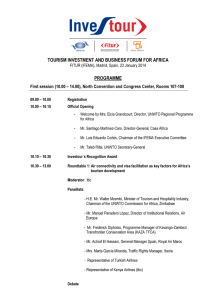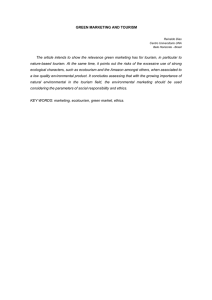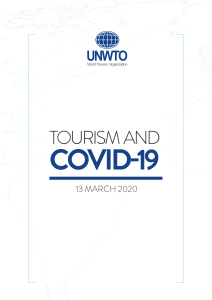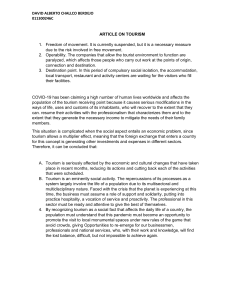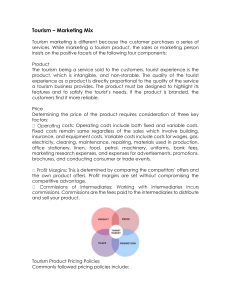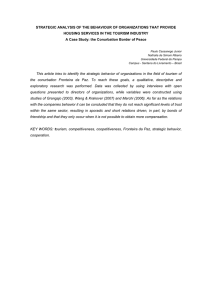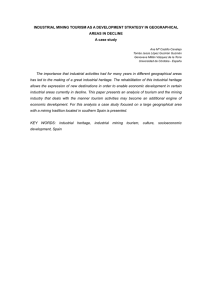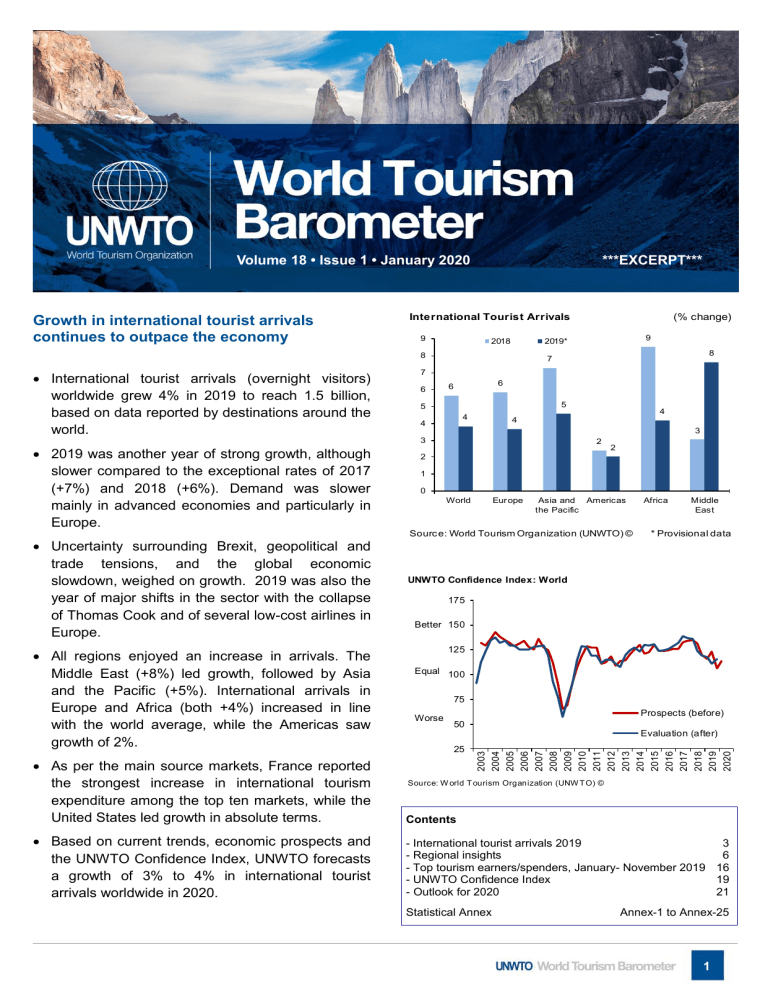
Volume 18 • Issue 1 • January 2020 Growth in international tourist arrivals continues to outpace the economy ***EXCERPT*** International Tourist Arrivals 9 2018 8 7 7 6 6 6 5 5 4 4 3 All regions enjoyed an increase in arrivals. The Middle East (+8%) led growth, followed by Asia and the Pacific (+5%). International arrivals in Europe and Africa (both +4%) increased in line with the world average, while the Americas saw growth of 2%. 2 2 2 1 0 World Eur ope Asia and Americas the Pacific Sourc e: World Tourism Organization (UNWTO) © Africa Middle East * Provisional data UNWTO Confidence Index: World 175 Better 150 125 Equal 100 75 Worse Prospects (before) 50 Evaluation (after) 25 2003 2004 2005 2006 2007 2008 2009 2010 2011 2012 2013 2014 2015 2016 2017 2018 2019 2020 Uncertainty surrounding Brexit, geopolitical and trade tensions, and the global economic slowdown, weighed on growth. 2019 was also the year of major shifts in the sector with the collapse of Thomas Cook and of several low-cost airlines in Europe. 4 4 3 2019 was another year of strong growth, although slower compared to the exceptional rates of 2017 (+7%) and 2018 (+6%). Demand was slower mainly in advanced economies and particularly in Europe. 9 2019* 8 International tourist arrivals (overnight visitors) worldwide grew 4% in 2019 to reach 1.5 billion, based on data reported by destinations around the world. (% change) As per the main source markets, France reported the strongest increase in international tourism expenditure among the top ten markets, while the United States led growth in absolute terms. Contents Based on current trends, economic prospects and the UNWTO Confidence Index, UNWTO forecasts a growth of 3% to 4% in international tourist arrivals worldwide in 2020. - International tourist arrivals 2019 3 - Regional insights 6 - Top tourism earners/spenders, January- November 2019 16 - UNWTO Confidence Index 19 - Outlook for 2020 21 Source: W orld T ourism Organization (UNW T O) © Statistical Annex 1 Annex-1 to Annex-25 1 Volume 18 • Issue 1 • January 2020 ***EXCERPT*** About the UNWTO World Tourism Barometer The UNWTO World Tourism Barometer is a publication of the World Tourism Organization (UNWTO) that monitors short-term tourism trends on a regular basis to provide global tourism stakeholders with up-to-date analysis on international tourism. The World Tourism Organization (UNWTO) is the United Nations specialized agency mandated with the promotion of responsible, sustainable and universally accessible tourism. UNWTO’s membership includes 159 countries, 6 Associate Members, two Permanent Observers, and over 500 Affiliate Members representing the private sector, educational institutions, tourism associations and local tourism authorities. Copyright © 2020 World Tourism Organization C/ Poeta Joan Maragall 42, 28020 Madrid, Spain UNWTO World Tourism Barometer ISSN: 1728-9246 Published and printed by the World Tourism Organization, Madrid, Spain - First printing: 2020 (version 20/01/20) All rights reserved The designations employed and the presentation of material in this publication do not imply the expression of any opinions whatsoever on the part of the Secretariat of the World Tourism Organization (UNWTO) concerning the legal status of any country, territory, city or area, or of its authorities or concerning the delimitation of its frontiers or boundaries. All UNWTO publications are protected by copyright. Therefore and unless otherwise specified, no part of a UNWTO publication may be reproduced, stored in a retrieval system or utilized in any form or by any means, electronic or mechanical, including photocopying, microfilm, scanning, without prior permission in writing. UNWTO encourages dissemination of its work and is pleased to consider permissions, licensing, and translation requests related to UNWTO publications. For permission to photocopy UNWTO material, please refer to the UNWTO website at www.unwto.org/publications The contents of this issue may be quoted, provided the source is given accurately and clearly. Distribution or reproduction in full is permitted for own or internal use only. Please do not post electronic copies on publicly accessible websites. UNWTO encourages you to include a link to www.unwto.org/market- intelligence World Tourism Organization C/ Poeta Joan Maragall 42, 28020 Madrid, Spain Tel (34) 91 567 81 00 / Fax (34) 91 131 17 02 [email protected] www.unwto.org Follow us on: 2 The information is updated several times a year and includes an analysis of the latest data on tourism destinations (inbound tourism) and source markets (outbound tourism). The Barometer also includes a Confidence Index based on the UNWTO Panel of Tourism Experts survey, which provides an evaluation of recent performance and short-term prospects on international tourism. The UNWTO Secretariat wishes to express its gratitude to those who have contributed to the production of this UNWTO World Tourism Barometer, in particular to institutions that supplied data, and to the members of the UNWTO Panel of Tourism Experts for their valuable feedback and analysis. This report was prepared by the UNWTO Tourism Market Intelligence and Competitiveness Department, under the supervision of Sandra Carvão, Chief of the Department. Contributors include (in alphabetical order): Fernando Alonso, Julia Baunemann, Michel Julian, Lili Kfoury and Javier Ruescas. For more information including copies of previous issues, please visit: www.e-unwto.org/loi/wtobarometereng We welcome your comments and suggestions at [email protected]. Data collection for this issue was closed mid-January 2020. The next issue of the UNWTO World Tourism Barometer with more comprehensive results is scheduled to be published on May 2020. Pages 1-5 of this document constitute the Excerpt of the UNWTO World Tourism Barometer. The full document is available free of charge for UNWTO Members and subscribers from the UNWTO elibrary at www.e-unwto.org. This release is available in English, while the Statistical Annex is provided in English, French, Spanish and Russian. hange) Volume 18 • Issue 1 • January 2020 ***EXCERPT*** International tourist arrivals 2019 International arrivals up 4% in 2019 International tourist arrivals (overnight visitors) grew 3.8% in 2019 compared to the previous year, according to data reported by destinations. 2019 was the tenth consecutive year of sustained growth since 2009. UNWTO estimates that destinations worldwide received around 1.5 billion arrivals in 2019, about 54 million more than in the previous year. year 2019. Growth by region was also in line with the projections, except the Middle East which grew above what was forecasted. International Tourist Arrivals, World 8 (% change) 7.2 6.7 6 5.1 4.8 4.7 5.6 5.1 4.1 4.8 3.8 4 2 to 4 3.8 34.0 1.9 0 International Tourist Arrivals by month World (million) -2 -4 160 -4.0 -6 2008 2009 2010 2011 2012 2013 2014 2015 2016 2017 2018 2019 2020 (f) 10-year average 140 120 Source: W orld T ourism Organization (UNW T O) © (f) Forecast 2019* 100 2018 2017 80 2016 60 Jan. Feb. Mar. Apr. May Jun. Jul. Aug. Sep. Oct. Nov. Dec. Source: W orld T ourism Organization (UNW T O) © This represents a consolidation of the 6% growth recorded in 2018, though at a slower pace and below the annual average of 5% of the last ten years (2009-2019). Growth in international tourist arrivals continued to outpace the world economy (+3.8% vs +3.0%). The Middle East (+8%) and Asia and the Pacific (+5%) led growth. International arrivals in Africa and Europe (both +4%) grew in line with the world average, while the Americas (+2%) saw more moderate increase. International air traffic grew in line with international arrivals International air passenger traffic, measured in revenue passenger kilometres (RPK) saw a similar pattern to that of international arrivals, with a 4.0% increase through November 2019, according to the International Air Transport Association (IATA). All regions contributed positively to this result. However, the growth pace, as in the case of arrivals, is below the long-term average of 5.5%. Data by ForwardKeys show that international departures based on air bookings in 2019 grew by 5%, with departures from Asia and the Pacific and Africa showing the highest growth among world regions. Expected international departures worldwide for the period January 2020-April 2020 remain particularly strong (+10%). By subregions, North Africa (+9%), South-East Asia and South Asia (both +8%) showed the highest growth, followed by Southern and Mediterranean Europe and the Caribbean (both +5%). The 3.8% increase in international arrivals was fully in line with UNWTO’s forecast of 3% to 4% for the 3 3 Volume 18 • Issue 1 • January 2020 ***EXCERPT*** Outlook for 2020 – Positive but cautious Economic growth is projected to pick up to 3.4% in 2020 from 3.0% in 2019 according to the International Monetary Fund’s World Economic Outlook update of October 2019, reflecting primarily an improvement in a number of emerging markets in Latin America, the Middle East, and Europe. Yet, with uncertainty about prospects for several of these countries, projected slowdown in China and the United States, and prominent downside risks, a much more subdued pace of global activity could well materialize. The latest UNWTO Confidence Index shows a cautious optimism for 2020: 47% of UNWTO Panel Experts believe tourism will perform better and 43% at the same level of 2019. Based on current trends, economic prospects and the UNWTO Confidence Index, UNWTO forecasts a growth of 3% to 4% in international tourist arrivals worldwide in 2020, keeping the same positive pace of 2019 However, prospects may be affected by a worsening of the economic scenario as well as of current trade and geopolitical tensions. Brexit’s impact on Europe could affect euro area countries and benefit destinations outside the Eurozone, as was the case already in 2019. Trade, social and geopolitical tensions may affect prospects for Latin America, Asia and the Pacific and the Middle East. As in previous occasions external shocks happening in specific countries may lead to a redistribution of travel to other destinations. In a more favourable scenario, the Brexit transition, the first phase of the US-China trade deal and the gradual improvement of the social environment, could give more clearer signs to the economy as tensions unwind. Also on a positive note, a number of major sports and cultural events taking place in 2020, including the Tokyo Summer Olympics, the Dubai Expo 2020 and the Beethoven 2020 Year in Germany, are expected to drive demand. Outlook for International Tourist Arrivals Change 2020 Projection a year (issued January) 2016 2017 2018 2019* 2009-2019* from World 3.8% 7.2% 5.6% 3.8% 5.1% +3% to +4% Europe 2.5% 8.8% 5.8% 3.7% 4.6% +3% to +4% Asia and the Pacific 7.7% 5.7% 7.3% 4.6% 7.1% +5% to +6% Americas 3.7% 4.7% 2.4% 2.0% 4.6% +2% to +3% Africa 7.8% 8.5% 8.5% 4.2% 4.4% +3% to +5% Middle East -4.7% 4.1% 3.0% 7.6% 2.7% +4% to +6% Source: World Tourism Organization (UNWTO) © 4 average * Provisional data Volume 18 • Issue 1 • January 2020 ***EXCERPT*** International Tourist Arrivals by (Sub)region Monthly/quarterly data series Share (million) Change % change over same period of previous year (%) (%) 2019* 2019* 18/17 19*/18 Q1 2010 2017 2018 2019* Q2 Q3 Q4 Jul. Aug. Sep. Oct. Nov. Dec. World 952 1,332 1,407 1,461 100 5.6 3.8 3.3 5.4 3.5 2.8 3.5 3.1 4.2 3.2 2.9 2.3 Advanced economies¹ 515 732 761 776 53.1 4.1 1.9 2.0 4.0 2.0 -1.0 1.8 0.9 3.7 -0.4 -1.1 -1.6 Emerging economies¹ 437 600 646 685 46.9 7.6 6.1 4.7 7.3 5.7 6.8 5.9 6.1 4.8 7.6 6.8 6.1 2.3 By UNWTO regions: Europe 487.0 676.6 716.1 742.3 50.8 5.8 3.7 2.3 4.8 3.7 3.3 2.5 3.6 5.2 3.8 3.5 Northern Europe 57.0 79.1 78.7 79.6 5.4 -0.6 1.1 0.4 0.6 2.6 0.2 1.6 4.0 2.1 1.0 -0.8 0.2 Western Europe 154.4 192.7 200.2 203.8 14.0 3.9 1.8 -1.7 4.7 2.5 0.1 -0.5 0.0 10.4 0.6 1.9 -2.1 Central/Eastern Eur. 98.6 136.9 148.5 154.3 10.6 8.5 3.9 4.9 4.5 2.5 4.7 2.1 3.3 2.2 4.7 4.3 5.0 Southern/Medit. Eur. 177.1 267.9 288.8 304.6 20.8 7.8 5.5 5.1 6.1 5.1 5.7 5.0 6.0 4.2 5.8 5.9 5.2 - of which EU-28 382.4 540.5 562.4 577.2 39.5 4.1 2.6 1.6 3.6 2.7 2.1 1.1 2.5 4.9 2.4 2.6 1.1 Asia and the Pacific 208.2 324.1 347.7 363.6 24.9 7.3 4.6 6.3 7.4 3.2 1.7 6.3 0.7 2.7 2.1 1.7 1.3 North-East Asia 111.5 159.5 169.2 172.2 11.8 6.1 1.8 8.2 8.1 -1.0 -7.3 5.5 -5.9 -2.6 -5.7 -8.4 -7.7 South-East Asia 70.5 120.6 128.6 138.6 9.5 6.7 7.8 4.3 6.3 8.5 12.1 7.3 8.8 9.4 12.4 12.7 11.3 Oceania 11.5 16.6 17.1 17.5 1.2 2.9 2.6 -0.3 3.6 3.0 4.2 2.1 4.6 2.3 2.7 3.1 6.0 South Asia 14.7 27.5 32.8 35.3 2.4 19.4 7.7 9.6 10.1 4.8 7.2 8.4 2.2 4.1 7.3 11.0 3.6 Americas 150.3 210.7 215.7 220.1 15.1 2.4 2.0 -0.6 4.0 2.3 2.5 2.8 2.3 1.6 1.9 2.4 3.0 North America 99.5 137.1 142.2 146.2 10.0 3.7 2.8 -1.1 3.5 3.6 4.9 4.3 2.9 3.7 5.0 4.8 4.8 Caribbean 19.5 26.0 25.8 27.1 1.9 -0.9 4.9 15.1 8.1 -3.9 -0.7 -3.5 -2.4 -6.7 -3.6 0.1 0.6 Central America 7.8 11.1 10.9 11.1 0.8 -2.0 2.2 -2.1 5.5 3.5 3.0 5.2 2.2 3.0 1.2 3.1 4.2 South America 23.5 36.4 36.9 35.7 2.4 1.2 -3.1 -7.8 2.9 -0.2 -4.4 0.3 2.9 -3.9 -7.7 -5.0 -1.6 Africa 50.4 63.0 68.4 71.2 4.9 8.5 4.2 2.9 6.2 4.0 3.5 5.5 3.7 2.6 3.3 3.9 3.4 North Africa 19.7 21.7 24.1 26.3 1.8 11.1 9.1 9.0 11.8 8.7 7.0 12.4 4.0 10.2 8.5 6.9 5.6 Subsaharan Africa 30.7 41.3 44.3 44.9 3.1 7.1 1.5 0.2 3.0 0.4 1.8 -0.8 3.4 -1.7 0.5 2.6 2.3 Middle East 56.1 57.7 59.4 63.9 4.4 3.0 7.6 8.2 7.3 7.1 5.6 5.2 8.1 7.5 7.1 5.2 4.6 Source: World Tourism Organization (UNWTO) © (Data as collected by UNWTO, January 2020) * Provisional data ¹ Classification based on the International Monetary Fund (IMF), see the Statistical Annex of the IMF World Economic Outlook of April 2017, page 175, at www.imf.org/external/ns/cs.aspx?id=29. See box in page 'Annex-1' for explanation of abbreviations and symbols used International Tourist Arrivals (% change over same period of the previous year) 25 2019* January - December 2019* 19 20 15 11 10 9 8 8 6 5 5 1 6 2 8 8 7 7 5 4 4 4 7 2 3 3 4 3 2 3 1 1 0 -1 -1 -2 -5 Europe Source: World Tourism Organization (UNWTO) © 5 Asia and the Pacific Americas -3 Africa Middle East 5 UNWTO World Tourism Barometer International Tourism Highlights, 2019 Edition Compendium of Tourism Statistics Yearbook of Tourism Statistics Tourism Towards 2030 Guidelines for Success in the Chinese Outbound Tourism Market (2019) Exploring Health Tourism (2018) The Gulf Cooperation Council (GCC) Outbound Travel Market (2018) European Union Tourism Trends (2018) UNWTO/GTERC Asia Tourism Trends, 2019 Edition ‘Overtourism’? Understanding and Managing Urban Tourism Growth beyond Perceptions Volume 2: Case Studies (2019) ‘Overtourism’? Understanding and Managing Urban Tourism Growth beyond Perceptions (2018) New Platform Tourism Services (or the so-called Sharing Economy) - Understand, rethink and adapt (2017) www.unwto.org/publications
